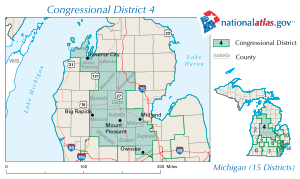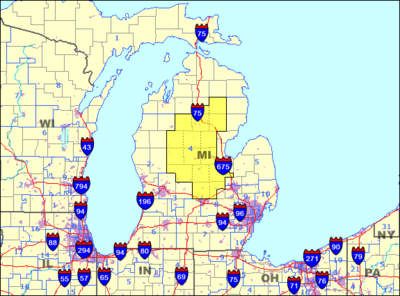- Michigan's 4th congressional district
-
"MI 4" redirects here. MI 4 may also refer to M-4 (Michigan highway)."MI 4" redirects here. For other uses, see MI-4 (disambiguation).
Michigan's 4th congressional district Current Representative Dave Camp (R–Midland) Distribution 41.57% urban, 58.43% rural Population (2000) 662,563 Median income $39,020 Ethnicity 94.2% White, 8.1% Black, 0.8% Asian, 2.4% Hispanic, 0.9% Native American, 0.3% other Cook PVI R+3 Michigan's 4th congressional district is a United States Congressional district that currently includes portions of Northern and Central Michigan, consisting of all of
Clare, Grand Traverse, Gratiot, Isabella, Kalkaska, Leelanau, Mecosta, Midland, Missaukee, Montcalm, Osceola, and Roscommon counties and the northern portion of Shiawassee and most of the western portion of Saginaw counties.
The 4th is currently represented by Dave Camp. This district has had Republican representation since the 1970s.
Contents
Major cities
- Midland
- Saginaw Township
- Mount Pleasant
- Owosso
- Traverse City
- Thomas Township
- Bridgeport Township
- Big Rapids
- Alma
History
Michigan's 4th Congressional District was first formed in 1852. At this time It covered everywhere from Macomb County to the western end of the Upper Peninsula. Ingham County was not in the district, and then the boundary turned northward after Eaton County only going west again Midland County was reached. It went west again along Midland and subsequent counties southern lines and then headed north again on the east side of Muskegon County, with Manistee being its southern county that bordered Lake Michigan.
In 1863 it gained the areas around Grand Rapids and Muskegon but lost everything east of Ionia County and most of the Upper Peninsula. In 1872 it was redrawn to cover Berrien, Cass, Kalamazoo, Van Buren and St. Joseph Counties. In 1892 these boundaries were altered by the addition of Allegan and Berry Counties but the subtraction of Kalamazoo County. This remained the district boundaries for the next 72 years.
In 1964 the 4th district was finally redrawn. Berry County was subtracted from the district while Branch and Hillsdale Counties were added. In 1972 the district boundaries were altered by adding small sections of Calhoun County and subtracting small portions of Hillsdale and St. Joseph Counties.
The 1982 redistricting saw the loss of all of Hillsdale County from the district and that portion of Calhoun County that was in the district. Quincy and Butler Townships in Branch County were also removed. In Kalamazoo County Schoolcraft Township and most of Portage were added to the district. The souther and western portions of Allegan County and most of western Ottawa County including Holland, Michigan were also in the district.
In the renumbering of 1992 this district essentially became the 6th, while the old 10th decame the new 6th.
The old 10th and 1990s 6th
The old 10th included most of Grand Traverse and all of Kalkaska County which were lost to the new 1st (old 11th) in the 1992 redistricting. It also included Wexford County that was moved to the new 2nd (old 9th) in the 1992 redistricting. The only other areas lost were small parts of Antrim and Iosco Counties and a portion of Shiawasee County consisting of Durand and Vernon Township.
The new 4th gained Montcalm county from the old 9th district. It gained the Clinton and most of the Shiawasee portions of the old 6th district and the northern half of Oscoda County. It also gained a portion of south-west Saginaw County and the portion of Midland County that had not been in the old 10th.
In 2002 Leelaunau County and a small section of north-west Grand Traverse County were the only areas gerrymandered from the 1st and other districts into to the 4th that had not been in the old 10th.
List of representatives
Representative Party Years Congress Notes District created March 4, 1853 Hestor L. Stevens Democrat March 4, 1853 - March 3, 1855 33rd George Washington Peck Democrat March 4, 1855 - March 3, 1857 34th De Witt C. Leach Republican March 4, 1857 - March 3, 1861 35th-36th Rowland E. Trowbridge Republican March 4, 1861 - March 3, 1863 37th Francis William Kellogg Republican March 4, 1863 - March 3, 1865 38th Redistricted from the 3rd district Thomas W. Ferry [1] Republican March 4, 1865 - March 3, 1871 39th-41st Vacant March 4, 1871 –
December 4, 187145th Wilder D. Foster [1] Republican December 4, 1871 - March 3, 1873 42nd Redistricted to the 5th district Julius C. Burrows Republican March 4, 1873 - March 3, 1875 43rd Allen Potter Democratic March 4, 1875 - March 3, 1877 44th Edwin W. Keightley Republican March 4, 1877 - March 3, 1879 45th Julius C. Burrows Republican March 4, 1879 - March 3, 1883 46th-47th George L. Yaple Democratic [2] March 4, 1883 - March 3, 1885 48th Julius C. Burrows Republican March 4, 1885 - March 3, 1893 49th-52nd Redistricted to the 3rd district Henry F. Thomas Republican March 4, 1893 - March 3, 1897 53rd-54th Edward L. Hamilton Republican March 4, 1897 - March 3, 1921 55th-66th John C. Ketcham Republican March 4, 1921 - March 3, 1933 67th-72nd George E. Foulkes Democratic March 4, 1933 - January 3, 1935 73rd Clare Hoffman Republican January 3, 1935 - January 3, 1963 74th-87th Edward Hutchinson Republican January 3, 1963 - January 3, 1977 88th-94th David Stockman [3] Republican January 3, 1977- January 27, 1981 95th-97th Resigned after being appointed Director of the Office of Management and Budget Vacant January 27, 1981 –
April 21, 198197th Mark D. Siljander [3] Republican April 21, 1981 - January 3, 1987 97th-99th Fred Upton Republican January 3, 1987 - January 3, 1993 100th-102nd Redistricted to the 6th district Dave Camp Republican January 3, 1993–Present 103rd-111th Redistricted from the 10th district, Incumbent Notes
- ^ a b Thomas W. Ferry was re-elected to the House in the general election November 8, 1870; the Michigan Legislature subsequently elected him to U.S. Senate January 18, 1871; Wilder D. Foster was elected April 4, 1871 to fill the vacancy in the House.
- ^ George L. Yaple was elected as a fusion candidate, but was seated in Congress with the Democratic Party.
- ^ a b Dave Stockman resigned on January 27, 1981, to accept appointment as Director of the Office of Management and Budget under U.S. President Ronald Reagan. Mark D. Siljander was elected in a special election to fill the vacancy and assumed office on April 21, 1981.
References
- Govtrack.us for the 4th District - Lists current Senators and representative, and map showing district outline
- The Political graveyard: U.S. Representatives from Michigan, 1807-2003
- U.S. Representatives 1837-2003, Michigan Manual 2003-2004
- Martis, Kenneth C. (1989). The Historical Atlas of Political Parties in the United States Congress. New York: Macmillan Publishing Company.
- Martis, Kenneth C. (1982). The Historical Atlas of United States Congressional Districts. New York: Macmillan Publishing Company.
- Congressional Biographical Directory of the United States 1774–present
Michigan's congressional districts Current districts: 1 2 3 4 5 6 7 8 9 10 11 12 13 14 15
All districts: At-large 1 2 3 4 5 6 7 8 9 10 11 12 13 14 15 16 17 18 19
See also: Michigan's past & present Representatives, Senators, and Delegations, 2010 elections, 2012 elections
All U.S. districts – Apportionment – Redistricting – Gerrymandering – MapsCategories:- Congressional districts of Michigan
- Central Michigan
- Northern Michigan
Wikimedia Foundation. 2010.


